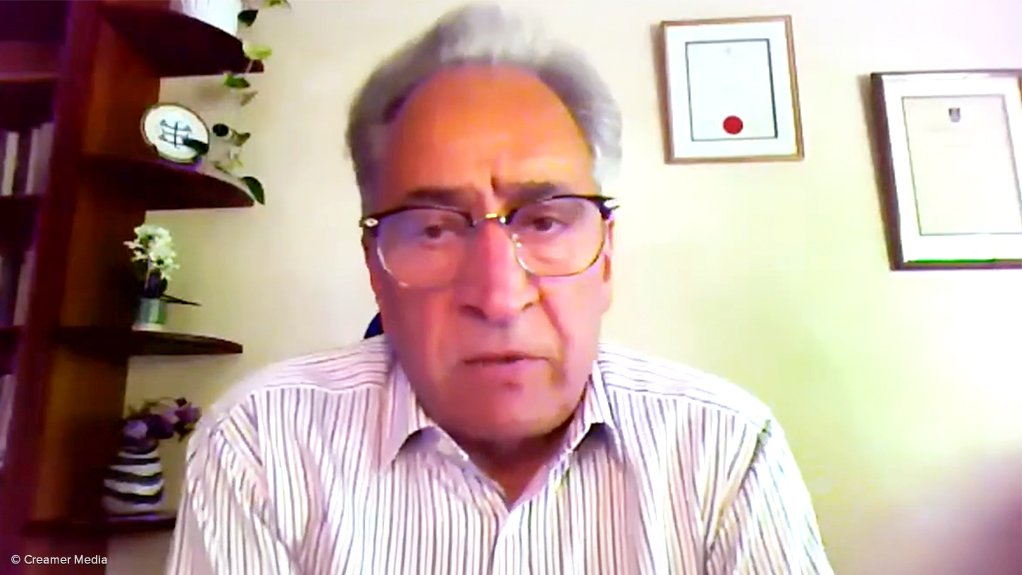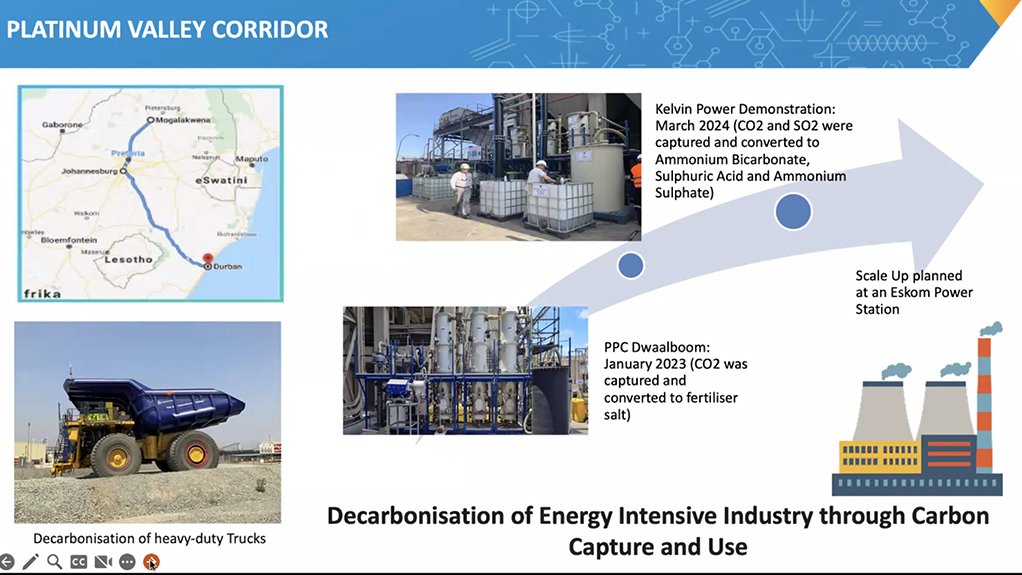JOHANNESBURG (miningweekly.com) – A strong renewed thrust is under way for the creation of a platinum group metals (PGM) commodities exchange in South Africa to take advantage of South Africa's massive PGMs endowment at a time when the forward momentum of the essential green technology that PGMs enable has reached the point of being irreversible.
From a global trading point of view, the PGM exchange envisaged would accelerate the process of price discovery on a digital platform governed independently by transparent rules and regulations.
“We’ve got all that it takes…and the timing couldn't be more favourable,” Pan-African Investment CE Dr Iraj Abedian highlighted at the tenth annual PGM roundtable of South Africa’s Mapungubwe Institute for Strategic Reflection, which was covered by Mining Weekly.
Mapungubwe Institute for Strategic Reflection executive director Joel Netshitenzhe concurred: “This discussion is meant to help us assess the progress that we are making and, self critically, to examine whether there are areas where we can do better.
“One such area is the issue of financial beneficiation, which we need to interrogate with frankness and strategic foresight, because it does not make sense that with 80% of the world’s reserves of PGMs, we should be promoting PGM exchanges in other parts of the world while resisting the establishment of one in our own country.”
Reiterated was that South Africa must extend the beneficiation value chain beyond refining and fabricating into financial beneficiation and by including commodity exchanges in a redefined national industrialisation strategy.
It was described as being important to note that South Africa's strategic positioning in PGMs diminishes with every day that passes, owing to more secondary markets increasing their share of global PGMs supply through the recycling and re-beneficiation of existing PGMs in different manufactured items around the globe.
But even with that, South Africa continues to have an overwhelmingly dominant global position, not only for now, but potentially for the next 100 years – and beneficiation has to be long-term orientated.
“It’s not a five-year or a ten-year or a short-term beneficiation. It’s the positioning of South Africa to have benefits for the next 100 years or so.
“If you want an example of it, look at the gold exchange in London. The London gold exchange was established more than 100 years ago, and even today, it's difficult to dislocate it. It stays put, and generates benefits for the UK, despite the UK not having an ounce of its own gold or gold mining.
“Importantly and critically, a commodity exchange is the most valuable end of a beneficiation value chain, at a time when PGMs are proving themselves as modernity's gift that keeps on giving. So, as we South Africans agonise over the many challenges we face, we need to remember our natural blessings,” said Abedian, whose constant contention during the event was to point out that a PGM exchange has the potential to link very beneficially to South Africa’s financial, legal, insurance, warehousing, logistics, and many other sectors. To the extent that it is a digital platform, a PGM exchange would enhance the globally growing digitalisation value chain.
In addition, the process of price discovery would provide South Africa with a long-term platform on which to develop the interrelated beneficial value within in the PGMs industry.
“We need to reimagine beneficiation,” Abedian added, while Netshitenzhe pointed out that the rise of AI and its data centres is creating energy demand “at a scale rarely seen in history”.
Such demand would likely double by 2030, a magnitude equal to today's total Japanese electricity consumption.
Many of the data centers are introducing PGM-based hydrogen fuel cells as their sources of energy to cope with AI requiring unprecedented data storage density.
“In this regard, the unique properties of ruthenium, which is part of the PGM family, have come into play in hard disk drives," Netshitenzhe pointed out, while noting that even in battery technology, palladium, another PGM, is providing higher energy density, slower discharge and better cyclability.
Besides China developing a major PGM-linked hydrogen industry, Japan, South Korea, Europe, Australia and North America are also rapidly advancing what is earth’s most abundant chemical element, amid South Africa, Namibia, Egypt, Kenya and Morocco also taking steps to ratchet up their green hydrogen reach.
“The issue is how we use our endowments for the benefit of society. Over the past year, we’ve seen a few industries scaling up to large electrolysis systems, which produce hundreds of megawatts of electricity. Airbus has announced that it will be ground testing a commercially viable hydrogen airliner by 2027.”
Blended finance has been secured for the green hydrogen fund, with joint participation by South Africa’s State-owned Public Investment Corporation, Industrial Development Corporation and Development Bank of Southern Africa, with support from the EU.
“The Coega green ammonia plant at Nelson Mandela Bay in South Africa’s Eastern Cape province is expected to achieve commercial production by 2029 and it has guaranteed offtakers in Europe and Japan.
“Skills development, from level four qualifications to doctorates, has been put high on the agenda.
“Eskom’s renewable energy business unit has initiated a process to set up a green hydrogen pilot facility.
“In other words, our country is becoming a critical contributor to the global hydrogen economy across the whole value chain, with PGMs at the core,” added Netshitenzhe.
During the course of 2024 and 2025, the Mapungubwe Institute completed research on South Africa's critical mineral strategy in partnership with Mintek and the Department of Mineral and Petroleum Resources, a strategy that has now been approved by Cabinet.
One of the estimates in the strategy is that Africa could create 2.3-million jobs and increase its GDP by 12% through local processing and beneficiation of critical minerals.
In relation to South Africa in particular, the mining industry is seen as having the potential to become a firm platform for a new industrialisation drive, an opportunity which needs to be seized now.
Regarding the research report on PGMs, Abedian commented: “It’s true that, at the moment, the report is primarily about PGM exchanges but the same can be spoken about manganese and other commodities, of which we have a fair share if not the dominant share.”
The creation of a PGM exchange has the potential to enhance the ranking of the Johannesburg Stock Exchange (JSE) by establishing a long-term platform. Preparatory work has been completed and an action plan is available for implementation.
“Two important additional features of a PGM exchange are that it records, tracks and stores all information exchange because it's all digitalised.
“It's like your bank statement, if you like, and the technology these days, with the help of blockchain technology, has become a fairly routine application.
“We’re not talking about inventing anything. We’re not talking about promoting anything.
We’re talking about applying what everybody else is using in other sectors and in the stock exchanges around the world.
“It also aggregates information from other markets and exchanges, and that reinforces the position that such an exchange would have in South Africa.
“Critical for the success is good governance and effective regulation, and this is the role that the government has to play.
“Interestingly, the establishment of a PGM exchange doesn't need fiscal input from government.
“We’re not asking for fiscal investment. We’re talking about proper regulation of the framework within which such an exchange would gain and establish credibility for the next centuries.
“Regulatory alignment would have to be with common global standards and legal principles.
“Exchanges have been with us for more than 100 years. We are not reinventing the wheel. Important in this day and age is the question of private information and cybersecurity, and in the end, it's the effectiveness of regulation and the seamless interplay of these various sectors that matter.
“The JSE has the existing technology, so we don't even have to invest in that. We have to apply and extend that.
“The success of it requires a policy framework across government, the South African Reserve Bank and the JSE.
“We’ve been in discussion with all of them and we’ve been participatory in the process of producing the report.
“The timing couldn't be more favourable and I contend that the establishment of a PGM exchange along the lines suggested would uplift South Africa’s global profile in a positive way,” Abedian emphasised.
This year’s Mapungubwe Institute for Strategic Reflection event has taken place at a critical inflection point for South Africa's economy and global positioning, which places a new responsibility on the South African government and the South African mining industry to seize every opportunity that can benefit the people of this country.
As the world’s largest consumer of PGMs, China is a major driver of the demand for platinum, which has risen to the highest level in more than a decade, with gains taking place at a time of market deficit.
As has been reported by Mining Weekly, the Guangzhou Futures Exchange (GFEX) in China is close to regulatory sign-off of the promising new trading framework.
GFEX is where physically settled platinum and palladium futures have the potential to transform domestic price risk management and uplift demand for platinum products.
Acceptable will be platinum and palladium in the form of ingots and sponge – pure metal in powder form – as opposed to just ingots.
The ability to take delivery of sponge could be transformative for industrial users of PGMs, as well as automakers, as this is the main form typically used for their manufacturing purposes. No other exchange in the world allows delivery of sponge.
As has been indicated, there is a willingness for a South African PGM exchange could work hand-in-hand with the GFEX through the JSE, with the benefit of functioning in different time zones.
EMAIL THIS ARTICLE SAVE THIS ARTICLE ARTICLE ENQUIRY FEEDBACK
To subscribe email subscriptions@creamermedia.co.za or click here
To advertise email advertising@creamermedia.co.za or click here















